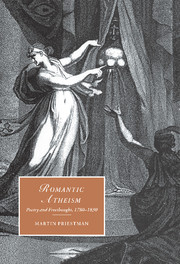Book contents
- Frontmatter
- Contents
- List of illustrations
- Acknowledgements
- Introduction
- 1 The atheism debate, 1780–1800
- 2 Masters of the universe: Lucretius, Sir William Jones, Richard Payne Knight and Erasmus Darwin
- 3 And did those feet? Blake in the 1790s
- 4 The tribes of mind: the Coleridge circle in the 1790s
- 5 Whatsoe'er is dim and vast: Wordsworth in the 1790s
- 6 Temples of reason: atheist strategies, 1800—1830
- 7 Pretty paganism: the Shelley generation in the 1810s
- Conclusion
- Glossary of theological and other terms
- Notes
- Bibliography
- Index
- CAMBRIDGE STUDIES IN ROMANTICISM
4 - The tribes of mind: the Coleridge circle in the 1790s
Published online by Cambridge University Press: 22 September 2009
- Frontmatter
- Contents
- List of illustrations
- Acknowledgements
- Introduction
- 1 The atheism debate, 1780–1800
- 2 Masters of the universe: Lucretius, Sir William Jones, Richard Payne Knight and Erasmus Darwin
- 3 And did those feet? Blake in the 1790s
- 4 The tribes of mind: the Coleridge circle in the 1790s
- 5 Whatsoe'er is dim and vast: Wordsworth in the 1790s
- 6 Temples of reason: atheist strategies, 1800—1830
- 7 Pretty paganism: the Shelley generation in the 1810s
- Conclusion
- Glossary of theological and other terms
- Notes
- Bibliography
- Index
- CAMBRIDGE STUDIES IN ROMANTICISM
Summary
Coleridge wrote obsessively about atheism in his prose outpourings and it haunts his poetry, whether in such explicit embodiments as ‘the owlet Atheism’ unable to see the sun in ‘Fears in Solitude’, or in the more subtextual perturbations of his great symbolic poems ‘Kubla Khan’ and ‘The Rime of the Ancyent Marinere’. In an understandable oversimplification, this obsession has sometimes been presented as a betrayal of his youthful ‘Jacobinism’, a belated turning to a religiose and German-inspired interest in metaphysics to cover his retreat into political reaction. Hence in Thomas Love Peacock's parodic Nightmare Abbey (1818), the Coleridge-figure Mr Flosky reels from disappointment with the French Revolution to the conclusion that
the overthrow of the feudal fortresses of tyranny and superstition was the greatest calamity that had ever befallen mankind; and that their only hope now was to rake the rubbish together, and rebuild it without any of those loopholes by which the light had originally crept in. To qualify himself for a coadjutor in this laudable task, he plunged into the central opacity of Kantian metaphysics, and lay perdu several years in transcendental darkness, till the common daylight of common sense became intolerable to his eyes.
This neat reversal of Coleridge's image of the sun-blind ‘owlet Atheism’ is not quite accurate, in that he was passionately and ‘metaphysically’ Christian from his most outspokenly radical phase (around 1793 to 1796) to his most conservative; nonetheless, the nature of his Christianity itself changed dramatically, and many of his writings on the subject before and after that change constitute an enthralling catalogue of the positions available at the time that could be charged with atheism, within the psychodrama of self-accusation and self-exculpation staged by a brain exceptionally alert to the resonances of the word.
- Type
- Chapter
- Information
- Romantic AtheismPoetry and Freethought, 1780–1830, pp. 122 - 155Publisher: Cambridge University PressPrint publication year: 2000



